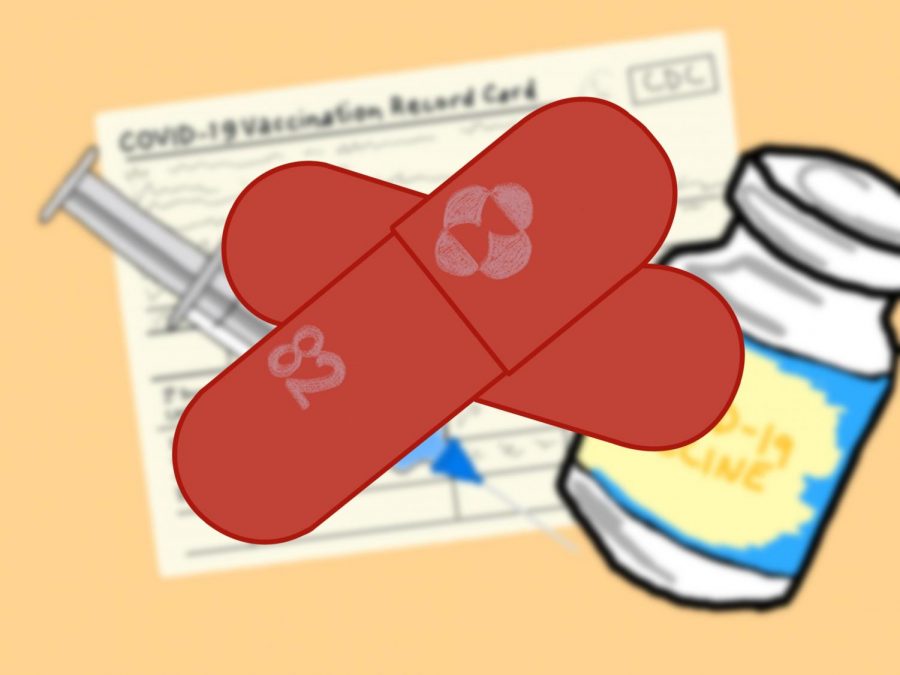Opinion: The COVID-19 vaccines remain the best weapons against the pandemic
A new antiviral medication developed by Merck is awaiting FDA approval. The potential approval and widespread use of this new medication could help save thousands of lives, but the vaccine remains the best deterrent to the pandemic.
The new Merck COVID-19 treatment pill is currently awaiting FDA approval. Though the pill is effective at treating early-stage COVID patients, vaccines are still our best chance at ending the pandemic. (Staff Illustration by Manasa Gudavalli)
October 19, 2021
On October 11th, the pharmaceutical company Merck requested that U.S. regulators approve their pill for use in treating COVID-19. Merck’s antiviral pill, named molnupiravir, would be a welcome addition to the COVID-19 treatment regimens. The Food and Drug Administration has yet to approve the pill and the results of Merck’s trials are awaiting peer review, but it seems to be a promising prospect in combating this nearly 2-year-long pandemic. Still, as promising as the results look, does the new drug stand up against the preventative powers of the vaccine?
Molnupiravir, in preliminary studies, has been shown to reduce hospitalizations by half among patients when given to those with early symptoms of COVID-19. During the 29-day trial, eight individuals died within the placebo group while none died in the group that took the pill. The medication is orally administered twice a day, two pills per administration, for five days. This oral pill is revolutionary among the other complicated, time-consuming intravenous COVID-19 treatments — molnupiravir could reduce time of hospitalization and keep hospitals uncrowded. Though promising, the pill has only been tested on those with mild-to-moderate infections, and no one in the study had exhibited symptoms for over five days. Additionally, despite having an efficacy rate of 50%, monoclonal antibodies — the intravenous treatment used today — still have a higher efficacy rate.
The vaccine has proven itself to be an effective deterrent to the virus. The Pfizer and Moderna vaccination both have efficacy rates above 70% for preventing the COVID-19 disease and infection. Johnson & Johnson, the single-dose shot available in the US, also boasts an efficacy rate above 50%. Even considering the more infectious Delta variant, vaccinated individuals have a sub-1% reported rate of cases, a sub-0.10% rate of hospitalization and a sub-0.02% rate of death. Unvaccinated individuals consistently make up over 90% of all COVID-19 cases in all 50 states and 96.91%-99.93% of all COVID-19 deaths.
As of Oct. 17th, 2021, 66.1% of Americans have received one dose and only 57.2% of all Americans are fully vaccinated. Of course, developing a medicine to combat COVID-19 as we attempt to vaccinate more people is beneficial. If and when the pill hits the shelves, it could help identify infection early and dramatically aid those who contract COVID-19. It could prevent thousands of deaths and dramatically reduce the strain on the healthcare industry. However, the vaccine continues to be the best way to fight and end this pandemic. As Dr. Anthony Fauci said, “It’s much, much better to prevent yourself from getting infected than to have to treat an infection.”
The pill — while preventing hospitalization and death — doesn’t prevent the contraction of the virus, the long-term side effects and the potential permanent disabilities that can arise from infection. It is more important to focus on pushing all Americans toward a largely successful preventative vaccine than toward a less-effective treatment drug — if not for immediate relief from the pandemic, then to ensure that we do not face the even greater threat of a mutated strain in the future.
Contact Srishti Bungle at [email protected].




























































































































































